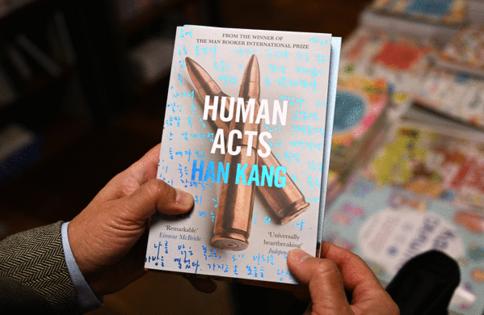Commentary: Conflict in South Korea reopens the very wounds examined in this year's Nobel laureate's work
Published in Op Eds
When the Nobel committee recognized Han Kang in October for her body of work exploring “the fragility of human life,” it could not have known how relevant the theme would feel in South Korea just two months later.
Han, the first Korean writer to win the Nobel Prize in Literature, has long been interested in the existence of the victims of violence, as explored in the context of the Gwangju democratic movement of 1980 in “Here Comes the Boy” or the Jeju uprising of 1948-49 in “No Goodbye.” By drawing out the historical traumas that have left deep scars in Korea’s modern history, the novelist seeks to remember and heal them.
And yet the trauma of Korean society is ongoing. On Dec. 3, as part of a power struggle, President Yoon Suk Yeol declared martial law, bringing hundreds of troops to surround parliament and raid the election commission. Lawmakers restored civilian control after about six hours, without major violence, and have since moved to impeach the president.
Han’s work shows how literature can lead a nation forward from moments like these. She critiques our institutions and our history, and she seeks to understand our people and to give hope. Han does this by examining the relationship between the local and the universal, the national and the global.
James Joyce once said: “I am always writing about Dublin, because if you can get to the heart of Dublin, you can get to the heart of any city in the world. In the particularity lies the universal.” Han found universals in the particularities of Korean family relationships, violence and democratic movements. Her award is just the latest confirmation that the path for Korean literature to globalize is not to seek the abstract universal, but to explore the roots of reality here and now in Korea. The film “Parasite” by Bong Joon-ho and the Netflix drama “Squid Game” also come from a similar cultural context and in their own ways, through the local nature of Korean society, exposed unspoken truths about the current stage of human civilization.
I believe that the unique power of Han’s work, expressed in poetic prose, lies in her ability to break with the shackles and norms that have been so strongly enforced in the Korean literary tradition. The criteria of outstanding literature are to show a certain difference and specificity, and such difference and specificity is not only possible through the individual competence of the writer but also through the accumulation of the cultural competence of the country and language to which she belongs.
Han’s award should be seen as honoring the rise of Korean culture over the last decade, with the spread and growth of the Korean Wave, or K-culture, which has seen Korean films and dramas win prestigious international art awards, and popular music, including BTS, spreading the nation’s influence around the world. This prominence is not possible without the accumulation of competence and the power of cultural voice.
The Nobel is sure to increase interest in Han’s work and to attract readers around the world, including to “The Vegetarian,” which was published in English in 2016, and next month’s English translation of “We Do Not Part.” I expect the award will increase interest in Korean literature in general. Those who do explore Han’s fiction will quickly realize it is far from superficially entertaining; her stories require careful reading and reflection on people and the world. It was never a safe bet that works such as hers would be “popular,” but if you put in the effort, you’ll be glad you did.
Readers around the world who delve into Han’s writing and also follow the news from South Korea will appreciate the bizarre incongruity that my country is experiencing now: We are celebrating a Nobel laureate who explored our past, while we also feel anew the threat of a coup d’état, martial law and state violence. In her acceptance speech, Han asked: “How are humans this violent? And yet how is it that they can simultaneously stand opposite such overwhelming violence? What does it mean to belong to the species called human? To negotiate an impossible way through the empty space between these two precipices of human horrors and human dignity, I needed the assistance of the dead.”
The events of December have only underscored that Korean democracy indeed does need the assistance of the dead, and of living artists such as Han, and of allies around the world.
____
Gilyoung O is a professor of English at Chungnam National University in South Korea and a literary critic.
©2024 Los Angeles Times. Visit at latimes.com. Distributed by Tribune Content Agency, LLC.




























































Comments